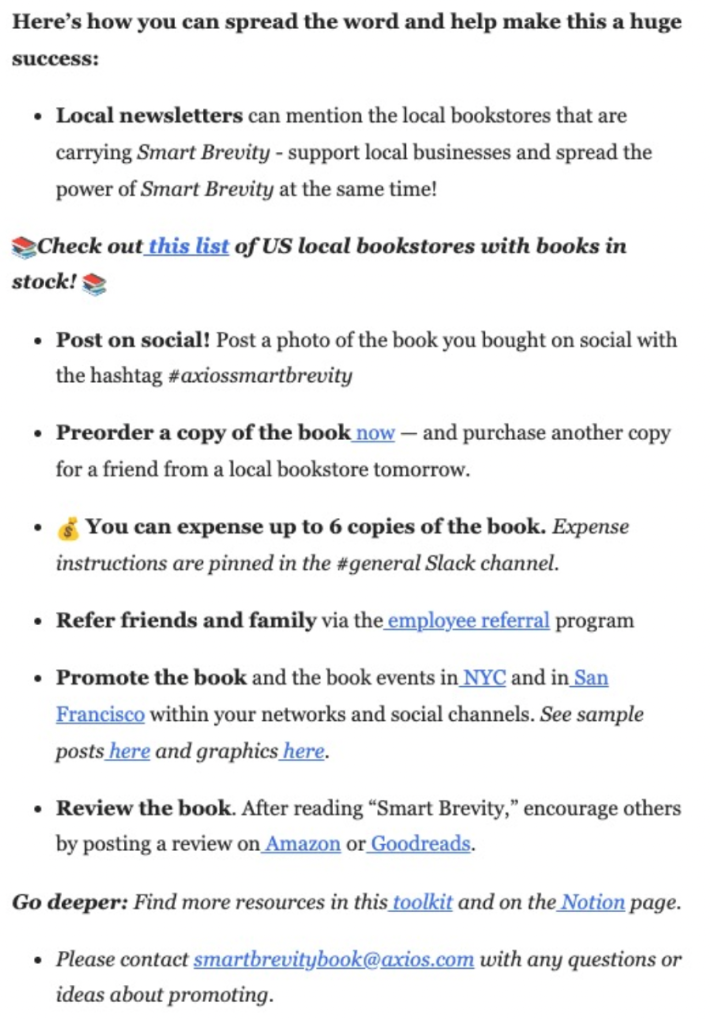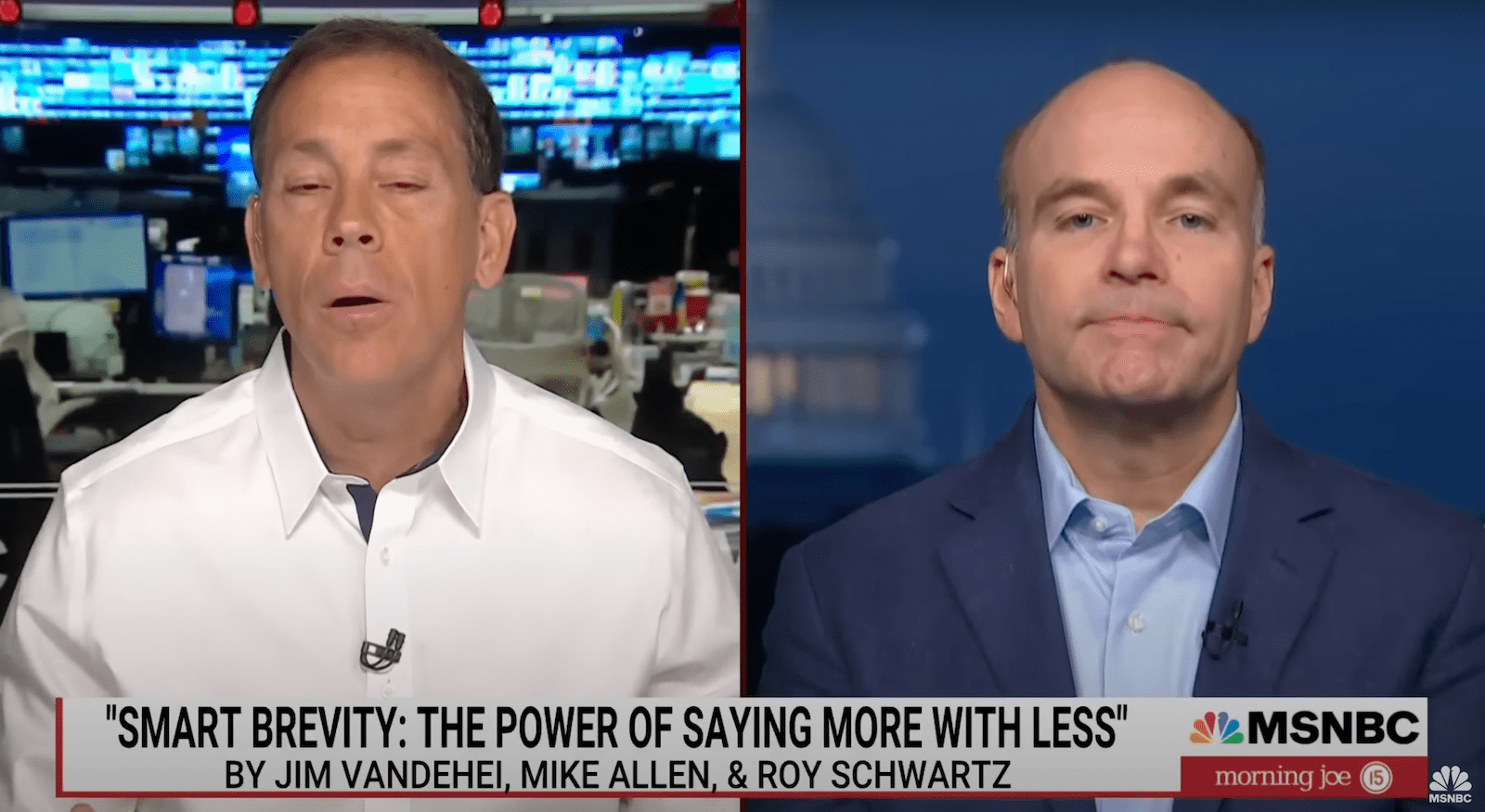Axios staffers received a memo on Monday suggesting several ways they could help promote a new book, Smart Brevity, which evangelizes Axios's short-format style for all essential written communication. "Brevity is confidence. Length is fear," the book's tagline goes. Authored by Axios co-founders Mike Allen, Roy Schwartz, and Jim VandeHei, the book went on sale Tuesday.
"Here's how you can spread the word and help make this a huge success," the memo read, before suggesting that employees post a photo of the book on social media with the hashtag #axiossmartbrevity, write (presumably positive) reviews of the book on Amazon and Goodreads, and buy six copies, each, of the book. The memo stressed that employees could expense the cost of those six copies to the company itself. With around 500 employees, and books at $24.30 a piece, this puts the company on the hook for about $72,500 if every employee decides to follow the memo's instructions.

Sweaty attempts to juice book sales and get on bestseller lists are nothing new in publishing. As the Guardian wrote in 2020, there have been numerous recent instances of authors or their proxies ordering copies of books in order to boost their numbers:
In 2017 a young adult novel was stripped of its No 1 spot on the NYT bestseller list after it was discovered that a series of huge pre-orders for Lani Sarem’s Handbook for Mortals had been placed in specific bookshops that report their sales to the NYT. (Sarem claimed she was buying her book for events, but she was later removed from the chart.) Compare that with Donald Trump Jr, whose book Triggered also made the No 1 spot when the Republican National Committee (RNC) spent $94,800 (£74,000) on a bulk order a week before it was released. (An RNC spokesperson said the purchase was made to “keep up with demand” among Republican party supporters.) Sarem’s book was removed from the list, while Trump Jr’s books were marked with a dagger, the NYT’s way of flagging a bulk order. Whole firms have even been set up to help authors buy their own books, because making the bestseller list is a surefire way to sell more – one 2004 study found that making the NYT bestseller list saw debut authors’ sales increase by 57%, while the average for all authors was a 13% boost.
Politics writers-cum-media barons attempting to astroturf support for their book by turning their own workers into an army of lightly coerced marketers, however, is a neat twist on the theme. Axios said in its post launching the book that all proceeds from sales will go to the Axios fellowship program. Of course, writing a bestseller doesn't just mean making more money in sales; it also affords authors more opportunities, prestige, and influence. It's clear that the better the Axios book sells, the better things are for the people who wrote it. Less clear is what exactly Axios employees have to gain from the book doing well.
In response to Defector's questions about the employee-centered marketing push and the amount of money the company set aside to buy copies of books for itself, Axios spokesperson Yolanda Brignoni said the book was a "team effort" and emphasized the fellowship program for journalists from underrepresented groups. "We, of course, wanted the team to have books for themselves and family," she added. Defector followed up to ask how the company decided on six (6) books per employee, and if the amount of money the company set aside to buy these books was greater than what it expected to earn from book sales (and then put towards the fellowship program). Brignoni said: "We are extremely invested in equipping this next generation of journalists with the skills and expertise to take their careers to the next level. So, we hope to sell a lot of books this week and moving forward."
Is this the book to equip the next generation of journalists with the skills and expertise to take their careers to the next level? Let's check out some reviews of the book, and its approach to journalism, from others in the industry. The New Republic's review, headlined, "The Axios Guide to Writing Well Is Neither Smart Nor Brief," read:
"...language will always be fundamentally political, and no demand for a rhetorical mode is ever neutral. As the National Association of Black Journalists Style Guide explains, our responsibility is to use words “correctly and appropriately,” not just quickly. Words arrive before us fraught with intended and unintended meanings. Syntax conveys not just the literal meanings of one’s words but education and intended audience. Responsible writers weigh the countervailing and sometimes contradictory impulses in writing constantly, deciding what’s best rather than what’s simply fast. Ultimately, “smart” writing is that which conveys a strong moral clarity: a sense of audience that is inclusive, a mitigation of the unintended effects of language, and an ability to state one’s position clearly without resorting to euphemism or obfuscation.
The Washingtonian, meanwhile, honed in on the book's prose:
Anyone who expects a book about writing to be, you know, well written will be flummoxed by the clanking prose in this one. “Think of Smart Brevity as a straitjacket on your worst instincts or habits in communication,” the authors write. “It’s a way to clean up and frame your thinking—then deliver it with a punch.” A straitjacket that helps you deliver a punch?
Even the reviewer for Wall Street Journal, which seemed the most inclined to say friendly things about the book, wrote:
The book’s short chapters are written in paragraphs, as all writing in English is, but about two thirds of these paragraphs have little dots to the left. “The bullet point is a wonderful way to isolate important facts or ideas,” the authors write. Maybe so, but the excessive use of bullets leads you to wonder why some bulleted paragraphs have no important facts or ideas, and some nonbulleted ones do. And anyway why am I thinking more about these little dots than about the subject matter? It’s a fine way to read if you want to go insane.
The book's biggest problem, however, is the same as Axios's problem, which is the same as media's problem: What "matters," to use the company's preferred term, is just whatever the people in charge think matters. The New Yorker's Clare Malone wrote a review of the book that focused on this critique:
When Axios tells its readers “why it matters,” in any particular story, it’s mapping its own narrative onto it, often with sources that are close to the corridors of power. These are the people who, in Washington or elsewhere, are most intimately involved in the details of a policy or a person of import. They’re important to talk to, but they have their own motivations and blind spots. This method can produce the kind of journalism that, though informative in a ticker-tape sort of way, enables conventional wisdom, which has got a lot of Americans angry at the media in the last few years.
[...]
In another spot, the authors laud the C.I.A. for making Trump’s President’s Daily Brief more concise—an example of “Smart Brevity” in the wild. It’s certainly demonstrative of some problem-solving in action, but it does seem odd for journalists to pat the intelligence agency on the back for glossing over details. In them lies the Devil, after all. But, for VandeHei, Allen, and Schwartz, it’s fair game for the experts—themselves included—to tell you what to think about any particular issue. Looked at one way, it’s a refreshingly up-front admission that this is the way a lot of—or maybe all—news outlets act. The civic argument for the “Smart Brevity” style is that it’s the sort of “just the facts, ma’am” kind of journalism that is needed to cut through partisan noise. Of course, the approach can tend to miss the often idiosyncratic views of the American public on any particular topic. Or just fail to calibrate what they see as important.
Anyhow, sales seem fine.
🚨 📚 #5 best seller on Amazon. We wrote this for students, teachers, managers, leaders - anyone who knows wants to communicate more effectively and efficiently. Great gift 😉 https://t.co/xoIBPYfx9M
— Jim VandeHei (@JimVandeHei) September 20, 2022
Signing and selling Smart Brevity for our good friends @PoliticsProse… pic.twitter.com/CHbYdJnHdQ
— Jim VandeHei (@JimVandeHei) September 21, 2022
📚Thank you, @PoliticsProse … “Brevity is confidence. Length is fear” https://t.co/IsShsJulOn pic.twitter.com/ZtG4kckL7P
— Mike Allen (@mikeallen) September 21, 2022
🚨 🚨 📚 Smart Brevity book up to #3 on Amazon. @mikeallen will sleep for first time in 15 years if we get to #1…#freemikey https://t.co/xoIBPYeZke
— Jim VandeHei (@JimVandeHei) September 20, 2022
Congrats to the team.






